Shortly after getting married in June, my wife and I agreed we’d start ‘lingering longer’ in our travels — and that we’d make an effort to travel around the United States on a literary endeavor we’d come to call the Falling Back in Love with America project. We announced it our post-wedding article, where I said this:
“If we’re truly blessed, we might just fall back in love with our country — standing fast by her to protect what remains of her old bones and tattered stories, writing her love notes, rekindling the world of Tom Sawyer and Johnny Appleseed. If I have any duty in my life, it is probably this...”
Months later, I’d find myself giving a talk on this project at a symposium in Wyoming, where I’d take a public comment from a Colonel in the US Army I greatly respect. He said: “I think you’re already in love with America. It’s visible on your face when you talk about this country.”
I could barely reply — of course I knew he was right. I’d spent my life traveling around this country, and if I’m honest, I spend most of my time thinking about America and her glories, her downfalls, her landscape — and I find myself thinking a great deal about how to fix this old country of mine up. My own revealed choices clearly tell on me here: I most certainly am already in love with America. Nevertheless, I’ve had plenty of ‘dark nights of the soul’ about this country of ours — and I suspect I am not alone on that score.
I’m pleased to offer you this first piece in the series. And I’m doubly pleased to announce that I am working with The Free Press — which is currently the largest publication on Substack — throughout the series, supplying them with monthly articles about our travels. For the next ten months, Hickman’s Hinterlands is going to be all “Falling Back in Love with America” all the time, and The Free Press is in on the action as well. The first article is here:
Now, without further ado — A Love Letter to America. My warmest thanks to all of you, not only for your interest and your paid subscriptions — but for your faith in this work. Enjoy!
Imagine a country where the bones are good.
Like an old house with hand-hewn beams and cross-cut timbers the likes of which no sawyer sells anymore – imagine a country that is strong and gorgeous. A country where the old stone ruins stand like stanzas of a tale that can never end; where the curtains of moss hang weeping above the crumbling slate gorges, and fishing boats rise in the morning tide as harbingers of peace and sanity. Imagine a country with the grandest of porches, where stiff-lipped aunties chortle and drawl over the foggy whisky glasses and knotweed snarls around the eaves and shingles – a country whose flag’s own bones lay like rows of heavenly sweetcorn beneath galaxies which tell tale of a benevolent artist of a God.
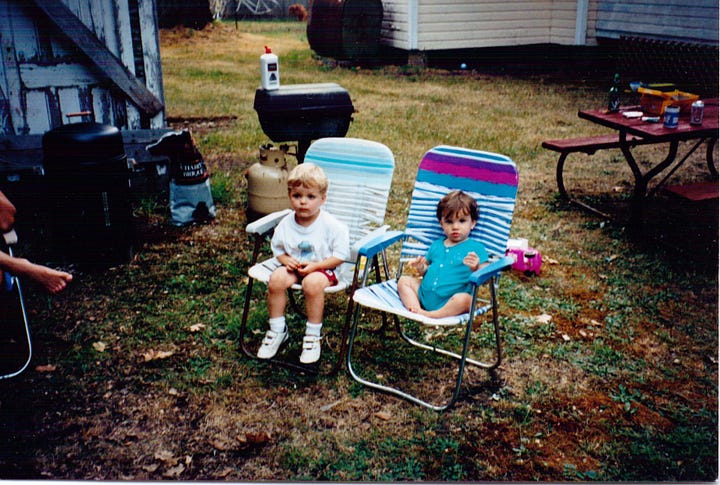
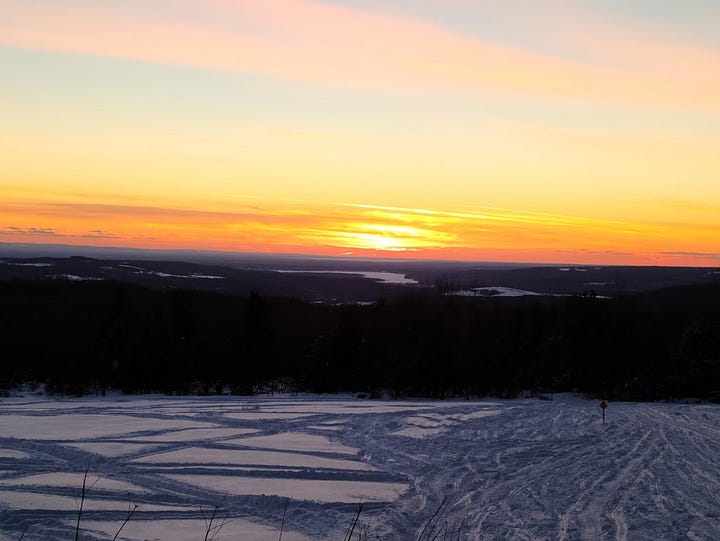

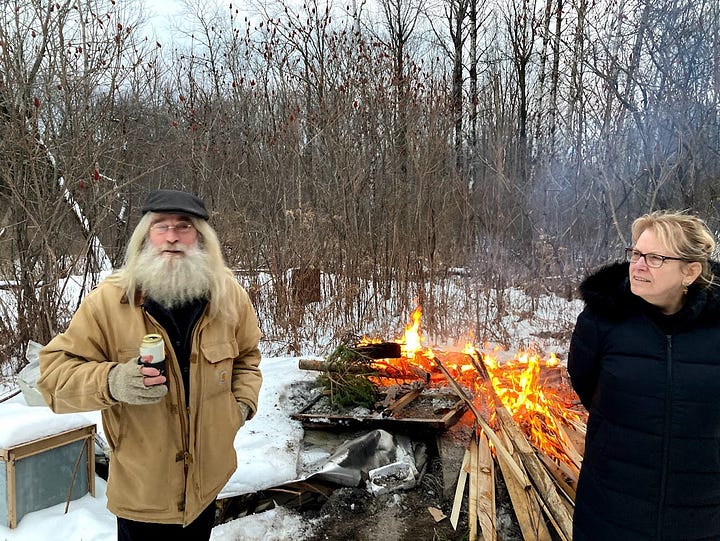
This country is my own country – America: She stands on with all the dizzying and fervent aplomb of a master’s finest painting, testifying to a rich and holy mythos and spirit, rising proudly in the suns of endless mornings, where untainted milk flows and cold spring water cleanses. Her barns were built by wiry men who blessed their cornerstones with tobacco spit and the endless cackle of implacable optimism. In rough shanties high along the hemlock highlands the babies bumbled in the midnight downpours of America’s feverish youth; dawn’s benediction came with curls of blue-grey tobacco smoke and old jam jars steaming full of boiled coffee – and with the dogged utterances of bearded men and their hard-eyed wives.
And in those mornings, their boys were out, up, leaping across dry brook chasms and slinging arrows above the river like a band of wild tribesmen; bellies full of blackberries and creekwater with burdocks in their hair. Crouching cliffside, those boys – us boys – clung to the gnarled roots of famous beeches, gazing out at the headwaters of America’s Mohawk River in the obscure northern tendrils of Upstate New York.
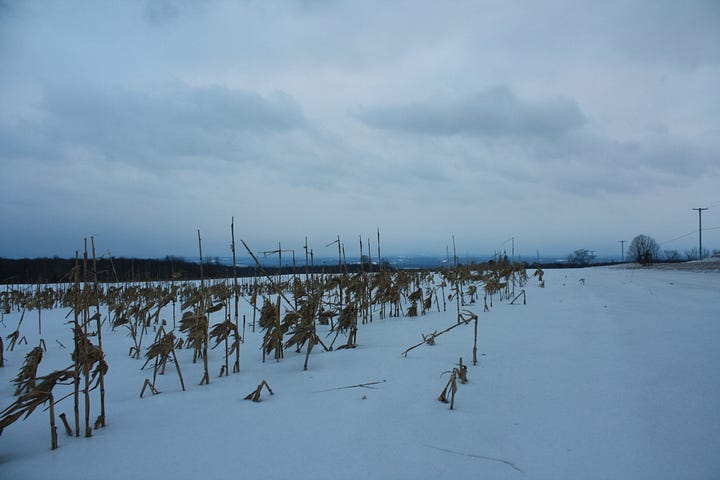
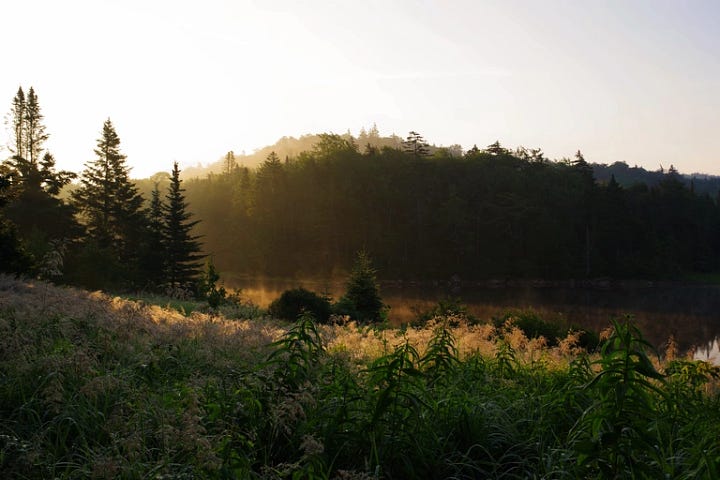
Our home was a place we loved above all else, and without question, the bones were good — and in fact, they still are.
Whenever I return to old Upstate, I think of the words of the great Fred Exley — the Watertown native who wrote the cult classic book, A Fan’s Notes. As he took the early-morning train north through Upstate in 1971, he wrote:
“In the vague way that one is aware of the contours of the back of one's head, I had always been aware that my corner of America was farm country, but only that morning did I realize how very northern or "Russian" — almost steppelike — it really was. After watching the slightly rolling, nearly treeless landscape for a long time, and doubtless abetted by the unconscious knowledge that I was rising on the map, I began to experience the oddly comforting sensation of ascending to the very top of the world, of rising to some place apart from the fitful concerns and harsh sorrows of men, to a glacial and opaline haven where a man, having been hard-used by the world or having used himself hard, might go and ask himself where things had gone wrong.”
This quality of Upstate New York is plainly visible as one crosses into the state from New England — a region which, I must declare with profound certainty, does not include any part of New York State. As one pushes west through Massachussetts on Route 2 from Williamstown, the transition is shocking. First, one spies great white mansions, neatly trimmed criss-cross lawns, wide, smooth roads, and brick-faced gates around large estates. The air is clean; there is an “end of history” quality to the place — a sense that the Bay State has succeeded in trouncing every fetid note in the long and miserable symphony of human suffering across every age; that the sorrowful days are over — forever. As one rides, the jazzy flutes of NPR’s daytime programming play… one’s head is floating in a Utopia, and they catch sight of the glorious vistas off the edge of the Berkshires, making the grand descent downward — into another world entirely.
Then — one’s Berkshire reverie comes to a slamming halt. “FUCK JOE BIDEN” hangs on billowing flags over a Tyvek-covered shanty, where a shirtless man is sucking on a cigarette on a caved-in porch. Giant old Victorian homes stand on in various states of decay with moss-covered buttresses and rotting Doric columns, and third-world-looking trailer parks sprawl beneath signs advertising Narcan and addiction rehab centers. A vape shop’s lights flicker over the cold, wet streets of a tired, empty village. The air seems to snarl with a dark, humid chill, and in the distance, the clouds swirl around the ghastly concrete tower of the state capitol complex in Albany — where suit-wearing men with New York City connections run the rest of the state like a bitterly-hated Siberian colony.
The descent from the clean, manicured pinnacles of the western Berkshires seems not only to be a literal descent, but to be imbued with a potently metaphorical quality as well. One rides with Oswald Spengler as they go downward toward Albany, meditating balefully on the Decline of the West. Further west, the grimness becomes routine as one transits through miles of deprecated factories and warehouses, by cracked-pavement strip malls and lurid scenes in gas station parking lots. Pop country radio crackles through the radio speakers at Betty Beaver’s gas station, whose sign features a lipstick-wearing beaver woman sporting three-dimensional plastic breasts. An obese couple counts their change at the counter as they buy seventeen scratch-off tickets and a pack of Seneca cigarettes. A drunk Italian guy in a Buffalo Bills onesy trips over his shoelaces; his daughter braids a Troll Doll’s hair in her carseat. The rain turns to sleet.
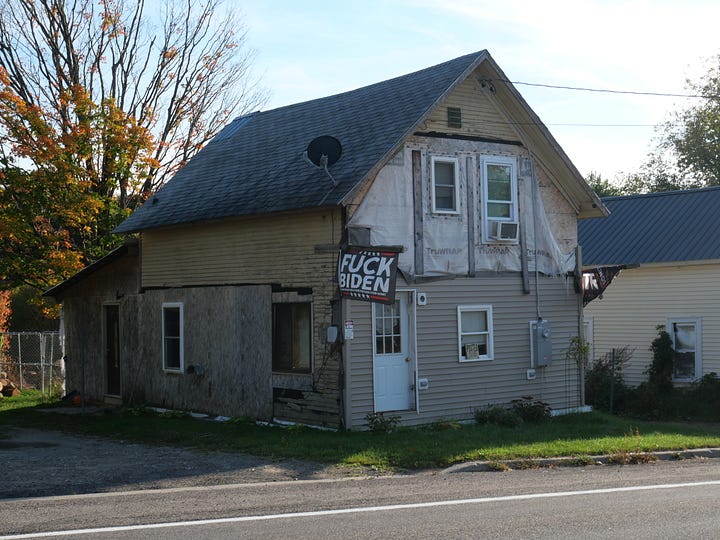
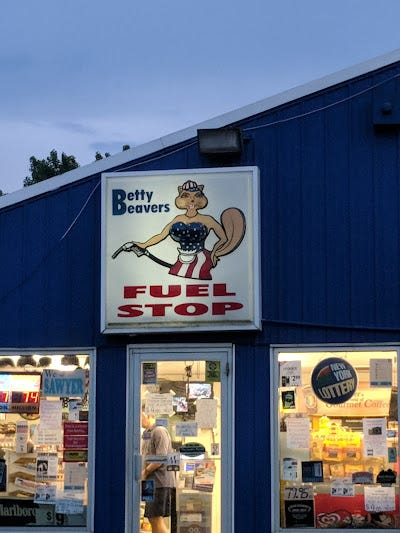
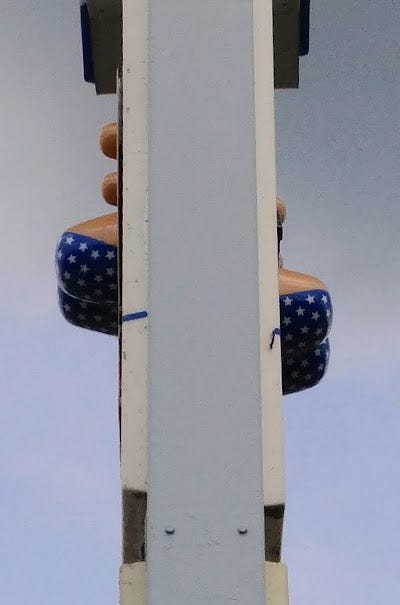
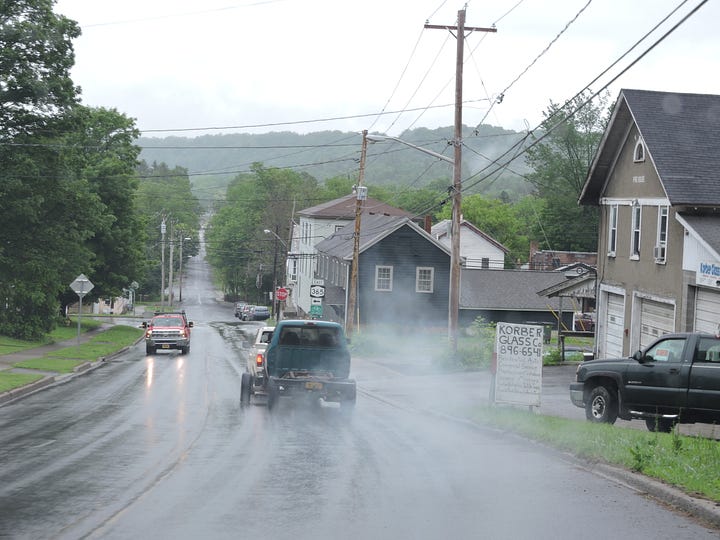
And then the realization sinks in like news of a dear old friend’s death: There beneath the giant plastic rodent breasts of Betty Beaver’s, you stand not only in the richest country in the world, but in the third-richest state in that country. Looking northward at the placid surface of the old Erie Canal, you also realize you are standing in the bread-basket of that great state. You are standing on the land that made this country as rich and powerful as it now is; the land the opened up the lakes and western rivers, the land that fed New York City for generations — and yet it is languishing in a state of complete and utter decreptitude.
Fred Exley then visits the brain like a filthy drunk visits a funeral:
“Where did things go wrong?”
Years ago at midnight, my cousin and I cracked our pints with complete and wordless unanimity, smiling at our good fortune. We’d been earning cold-hard cash, the sort of cash that gets paid to a man in the Stewart’s gas station parking lot in a hurry at dusk — cash still crisp and warm from the ATM. And every day, we were pulling what a lot of men worked a half-week’s time to earn. It was a woodworking outfit; a fly-by-night operation haphazardly thrown together by a DMT-smoking madman on an abandoned farm by the interstate. The farm had been purchased by missionaries from Ghana who’d rented our employer an old goat barn in which we turned scrap wood into saleable decor for wealthy online shoppers — buyers from places like Aspen and New York City.
“Selling garbage to rich people — you gotta fuckin’ love it, man!” was what the boss would exclaim in the sawdust-choked workshop every afternoon, just before heading into the silo for another psychedelic lunchbreak. Every day with this bearded DMT-smoking prophet of a woodworker was like a hallucination in and of itself — a blearying torrent of ideas and schemes, a litany of conspiracies and quasi-religious realizations; constant reminders that we are to “manifest our reality” and, at that, to “manifest money” even in our dreams. Meanwhile, the shellac fumigated the tiny office with the sawdust-covered computer running Windows ‘98 until we were all delirious, and we’d eat gas station chicken snack wraps for lunch with wood stain on our fingers.
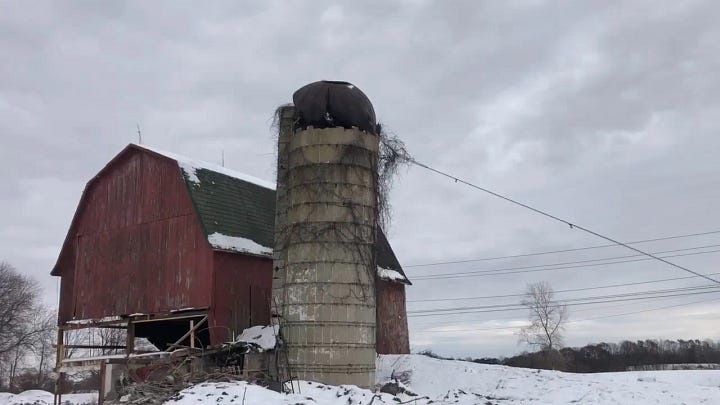


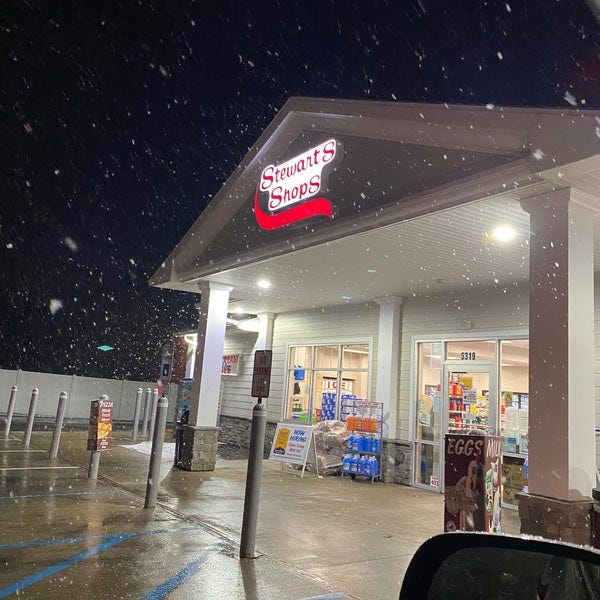
It’d been another fever dream of a day — a day when a scrap-wood sale had gone south with one of our boss’s sources. His man was fresh out of jail, aiming to score a good price per board foot, and hauled the load of soaking wet lumber out to the goat barn by his own accord. When the boss wouldn’t buy it, his associate stood out in the lawn, smoking a blunt, sagging his pants, screaming: “faggot, nigger, faggot, nigger,” over and over again at the boss in a sing-songy voice, gyrating and smiling. He told the farm’s caretaker — a drunk who scrapped metal for a living — about the boss’s outrageous refusal to buy his truckload of worthless rotting wood in an effort to damage his reputation. A spirited shouting match took place in the overgrown lawn, and the boss locked everyone out of the barn. Minutes later, one of the ex-con’s friends — a shifty-eyed, redheaded junkie — set our boss’s van on fire.
The smoke billowed madly into the air; the boss slurped at his nicotine vape-stick, spitting venom and curses at the fiendish arsonist. He kicked the dirt and yowled as the gas tank in his van leapt up in a delirious conflagration mere feet from the barn full of his precious lumber. His enemies sped off in a rusty Ford Taurus, spraying dirt and gravel in the air — his eyes were red with all the forlorn rage of a rodeo bull. Work ended early, and we were passed bigger gobs of cash than usual down at the Stewart’s from the glum boss-man. And the Etsy orders were shipped nonetheless — sent from this bizarre, dysfunctional backwater to the glistening lights of cafes and apartments in Brooklyn and Malibu and Miami Beach.
Flabbergasted and chuckling, my cousin and I picked up a case of beer and sailed north in his old Ford, back to the woods, to shoot the shit deep into the night by the woodstove in my cousin’s own woodworking shop.
“There’s no question in my mind,” he said with serious eyes. “We’re damn lucky to have grown up how we did.” Freezing rain sprayed on the roof in waves as he spoke. He went on to explain that by all he’d ever seen, most men our age had had far less idyllic childhoods than ours. The types of childhoods where a kid has got to report to his mother hourly, or worse — where he’s got to stay in mom’s sight at all times. We, by contrast, labored under no such tyrannies. We hauled big rucksacks up the river and set shit on fire. We boiled noodles on sandy islands and laid around like kings, and pushed giant boulders off cliffs. We strung up saplings with fishing-line and shot arrows at each other, skipped rocks, and climbed a hundred feet up giant maple trees. We’d hike five miles upstream or more — no cell phones — and wind up coming home bruised, cut, and half-starved, smiling like a pack of dogs in a butcher’s dumpster.
And in town, we had full run of practically every house. It didn’t matter if anyone was home — we went in, got a snack, and went out to the next house. Aunts and uncles, friends’ parents, Granny (my great-grandmother), the library. All the kids from the hills came down in the summer for the summer recreation program — which my grandmother ran — and we went on swimming trips, played fooseball in the basement, and had ‘pinecone wars’ up on the swingset. The Heritage Days festival would happen in July, too — when they’d read the whole Constitution, and we’d dress up in Revolutionary War era clothes to shoot muskets and go to ice cream socials with the old codgers from the Historical Society. There weren’t bike locks or meth labs. No one’s car ever got burned, and there wasn’t cell service either. George W. Bush was the President of the United States, and we wanted to be Navy Seals. Instead, we’d wound up working at a DMT-fueled three-ring-circus of a woodworking business in a derelict goat barn owned by Ghanian missionaries.
“How the hell did shit get so weird?” was my cousin’s concluding question after a long night of nostalgia. It was a damned good question. We’d been taking scrap-wood and turning it into wall decor; we’d been taking the bones of the early days we remembered so fondly and selling them to elsewhere; to places where people had money — places where people didn’t brawl and squabble and commit arson over piles of rotten wood.
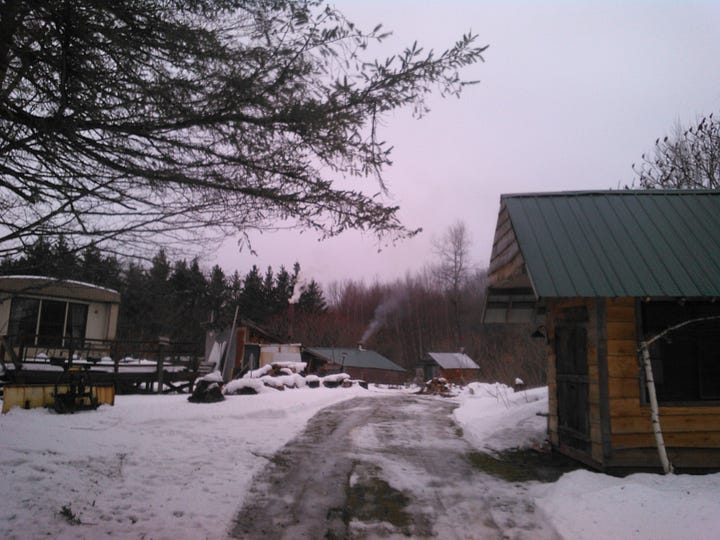
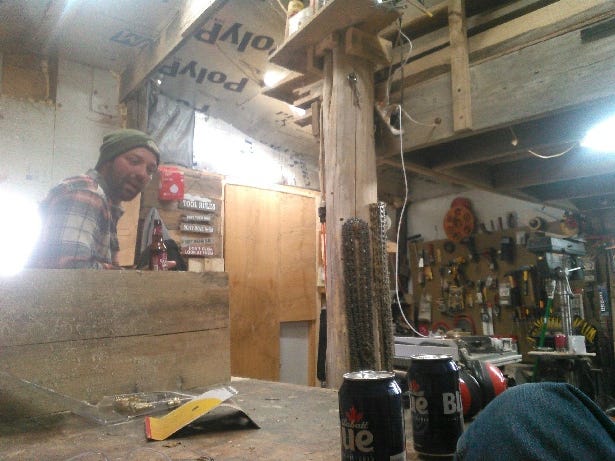
“I wonder what the people we’re selling to would have to say about that,” I mumbled as we drained our beers and the coals in the stove burned low.
He laughed — “there’s no way they’d even think we’re from the same country.”
I couldn’t argue with that, not after the day we’d had. As far as I’d ever learned — we weren’t from the same country, even if the flags flying over our towns happened to be the same.
Yet whatever chasms of difference may exist between this country’s citizens, some essential quality nevertheless succeeds in uniting us — or at least, it should.
I watch the US Border Patrol SUV’s speed by as I write this, and I know that I am a citizen of the country they represent. I am presently sitting within six feet of the US-Canada international border in a zone USBP calls the Swanton Sector, and I know the men in those SUV’s are not after me. They are instead after one of the 20,000-and-counting foreign nationals that have illegally crossed through this 200-mile stretch of land from Ogdensburg, NY to Pittsburg, NH this year (last year, that figure was less than a thousand). Everywhere in the woods and on the roadside, there are discarded jackets and mud-soaked pants, duffelbags shredded by the highway department’s lawnmowers, and eerie ‘portals’ into the brush where migrants have followed one another by the light of the moon into — or out of — the Land of the Free. And in the early mornings, I’ve seen tinted-window SUV’s with out-of-state plates prowling in the back acreage of farm fields, surrounded by backpack-wearing foreigners squatting in the brambles, waiting to proceed southward or northward to whatever their futures may hold.
What this crossing might mean to those illegally crossing here is as unknowable as their intentions or identities. For some, it may mean the quick profit of transporting a backpack full of liquor and pistols into the Dominion of Canada, or a routine run of envelopes full of heroin into the States. For others, they may seek the slower, sweatier profit of finding under-the-table work in restaurants in places the Bronx, or on roofing crews in Little Rock, or at lettuce farms in Texas. Others may approach the international line with trepidation, arriving as sex slaves, refugees from war-torn nations, involuntary drug mules, or as men seeking a way out of usurious debts to the Cartel. Unless the USBP agents I’ve known here have misguided me, the vast majority of those sneaking into the United States do so under dark and often tragic auspices.
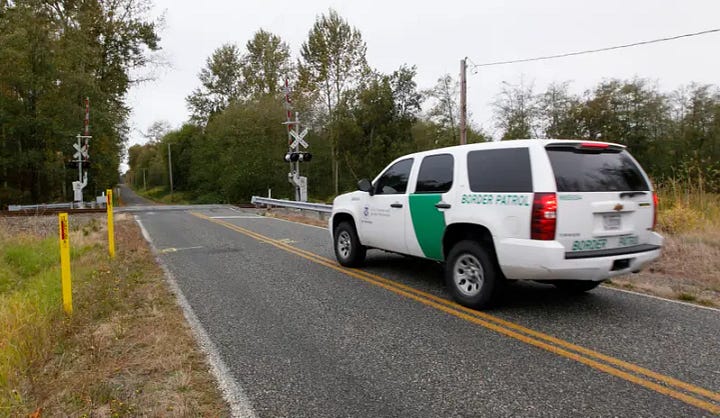
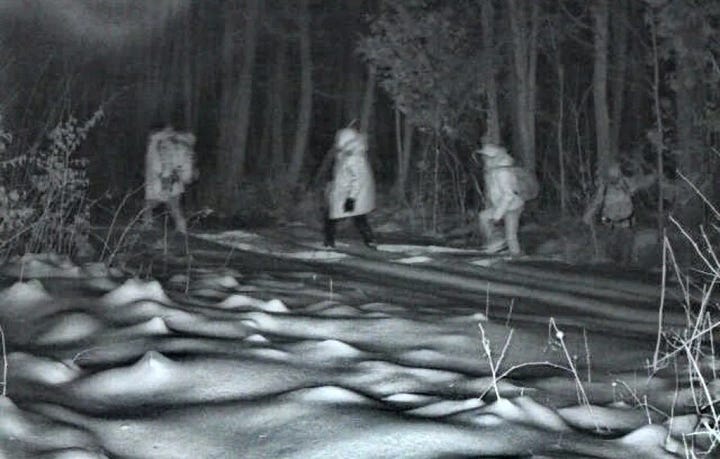
But there are others, I like to think, that make the harrowing journey through the dark thickets because they want to become American. On a border where illegal immigrants regularly die in winter’s subzero temperatures, it is not hyperbole to say that there are men on earth who are literally dying to become American.
I meditate on this as the Border Patrol SUV careens by, catching sight of its parent agency’s insignia — the logo of the Department of Homeland Security.
For one to ‘secure’ something, of course, they must know the boundaries of the thing they are to secure. The art and science of security is the art and science of exclusion and control — a world of fences and cameras and carefully-timed perimeter patrols. And yet this agency’s stated purpose is to ‘secure’ the homeland — an ill-defined, vaguely archaic, literary sort of word; a word that most Americans may never use in regular speech. In asking the Border Patrol agent exactly what the word “homeland” means it is hard to know what he would say. The only definite answer he could be likely to give would be essentially legal, though “homeland” is not a legal sort of word — he would state that it is his job to patrol and secure the international line between the United States and Canada.
But in truth, the word homeland cannot be summarized in such purely legal terms — for a homeland is not defined simply by lines, as a parking lot or a cattle pen is. It is a word that boils forth from the very core of a man — a forcefully romantic term that may for him comprise one of the most integral and absolute pillars of his identity and purpose. It is a word that no man of a milquetoast, half-assed disposition could use without smirking; a word only used by men who are in love, and at that, men who understand that love is a world of essences and mythos that defies the neat-and-tidy habits of the intellectual and the lawyer.
A homeland is a living organism, an extended family; it is the summation of land and literature, commerce and divinity, human ambition and conflict. The way a boy handles a broom or tears into his supper — the odd familiarity with which a young lady from Maine gazes out at the rocky beaches of the Oregon coastline. Mormons prophecying that Christ will return to, of all places, Missouri — the fearless, devil-may-care cackling of truck-driving men at the Love’s on the I-40. Balding Baltimore plumbers pinching at hookers’ hips at the Howard Johnson and Amish boys sneaking a puff of the pipe amid the coyote howls in old Indiana, and black cab drivers in Houston singing Waylon songs to the beat of the misfiring cylinders in their beat-up Ford. Tequila and twinkies and shotgun-shell full moons — plaster-faced cops with eyes like leather in Kansas — the view from the Hilton in Burlington on election night where aging wine moms impersonate Obama, and in the hills, leery-eyed buzzards fix their snowmobiles and skin the season’s first deer.

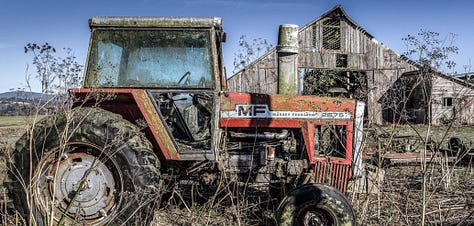
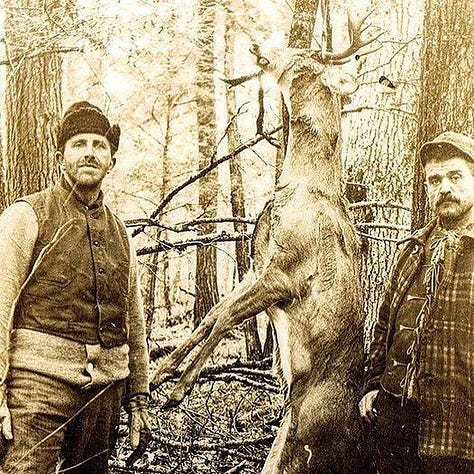
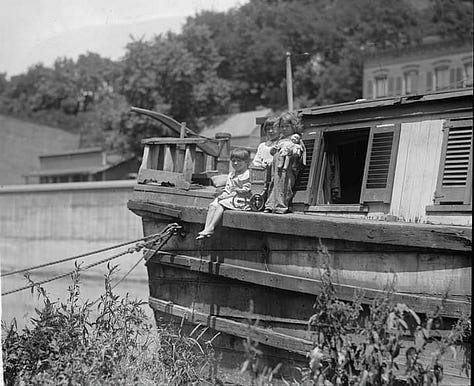


You know it when you see it, and all of us are seeing it every single day. Like fish to water, we get no bird’s-eye-views of it. It lives within us, rises in our blood like a long puff of Kentucky tobacco or a glass of bourbon on the Mississippi; fills us as full as Texas beef or Michigan cheese curd and a case of Chicago Old Style. A miracle, it altogether goes unnoticed within us, and yet whether we notice it or not it’s a tie that binds; a familial tie that makes our nation one big ‘ol family. Without that thing, whatever it is, America would only be an ‘economic development zone,’ and citizenship would simply mean you’re in the ‘human resources pool.’
And as I ride by the men who delve to make an “irregular crossing” into this country, I don’t think of paperwork. I don’t think of the Citizenship Test. In fact, I don’t think of bureaucracy at all — because a bureaucracy can’t show these people what kind of family they may or may not be hoping to enter. I’d rather pick them up and give them a ride, not to wherever they’re going, but into the heart of this whole country. I’d like to pick every single one of them up and personally take them on the ten-year journey I’ve taken through all forty-eight contiguous states as an American hobo.
We’d hitchhike from Maine to California, drive combines in Iowa, drink forties on the street in Saint Louis, eat barbeque with a dozen Priests in a tin shack in Louisiana, and ride out in a storm fishing on Lake Michigan until we’re sicker than dogs. We’d see the stars by the Pueblo ruins, read Twain and Bukowski, and visit Teddy Roosevelt’s favorite spots in North Dakota. Smoke a Black ‘n Mild at the Las Vegas bus station and wake up in lockup in Bakersfield, snarf down truck-stop chili dogs at the Flying-J on the I-5, and sing old Hank songs on a freight train across the Silver State. By the time I’d be done with them, they’ll either run as far from here as they can get — or they’ll be some of the finest Americans this country’s ever seen.
I figure, after all, that if getting Citizenship takes ten years, a trip like that would damn well be a better use of a decade than waiting in line at the INS office like some kind of a ‘human resource.’
Yet “shit has,” in the words of my cousin, “gotten so weird.” The ‘economic development zone’ model for nationhood has sprawled across the land as a homogenizing force, vandalizing the mythos and soul of the whole country, playing Pied Piper for a burgeoning class of Americans to whom the saccharine comforts of modern life take precedence high above any serious examination of the soul of America. In fact, many seem all too willing to gouge big slabs of that old soul and put it out for sale. For money — and the big cars, air conditioning, McMansions, and iPads it buys us — we’ll chop down mountains, carve up cities, clear-cut redwoods, and roll out massive strip-mall subdivision hell-zones through America’s greatest towns. We’d pave over Monticello and Yellowstone if it made us a buck, and we’d hire illegal immigrants to get the job done, too — so long as they don’t freeze to death on the border on their way in.
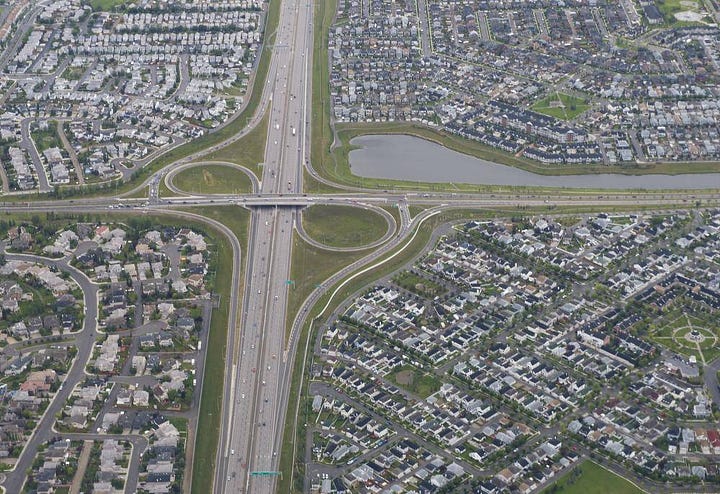

It’s a world of strip malls, strip clubs, and strip mines, and it’s the world I’ve spent the last ten years traveling through continuously. It’s my country — my homeland — and I’ve written plenty about my years as an American vagabond. No doubt I’ll write more, as those years simultaneously inculcated in me both profound disillusionment and die-hard passion for this country. It’s the land of Ruby Ridge and Breezewood, the nation of ‘Moonlite BunnyRanch’ and Love Canal; but it’s just as much the land of maple syruping parties, shrimp boats, roadside honkytonks and the Appalachian Trail. It’s a country of potency, vigor, and passion — a country where whatever we do, we overdo it. We overdo it so bad, it almost seems like we’ve overdone it just so we can have another “come to Jesus” moment — and then we start again.
These days we’re ready for that moment. Most of us are now so high on our own ‘economic development’ in one way or another that we seem to have lost a sense of what the hell we’re actually doing — and in these conditions, it seems surprisingly easy to entertain the idea that our American citizenship doesn’t mean much. Flags come down, state governors say “America was never great,” young Bitcoin bros move to El Salvador, intellectuals drift over the Atlantic to Europe, and the last dregs of patriotic sentiment any of us manage to drum up are largely gauche non sequiturs belched out chiefly to “piss off liberals.”
After all, as some distinctively enlightened folks tend to reason, we only just happened to be born here — between the lines that the Border Patrol secure and police. Had we been born elsewhere, we’d be singing a different tune, so in so many words, why sing a tune at all? Aren’t we all just human beings? Or is that ‘human resources?’
Then again — try to get a bluebird not to sing, or a rooster not to crow. It doesn’t happen — unless the old bird’s a little sick.
In spite of my own disillusionment — which has, to be sure, often been profound — I’ve seen enough of this country to know that the bones are good. Whatever we’re going through right now can’t last forever. I won’t let it — and if you’re an American, you shouldn’t either.
Because while it took me a few years to understand it, a nation isn’t just a set of lines on a map. It isn’t just a ‘workforce’ and a GDP. It isn’t just an extended family, either.
Having a country is a lot like having a party.
I can think of nothing more miserable than a party full of people who’d rather be anywhere else — a party where people sit around and complain, looking depressed, ignoring everyone around them, hiding from the dancefloor in their little enclaves where they discuss how much better every other party in town is. A party full of people who fight and break glasses, harass the bartender, and insistently state that they’ll refuse to have any fun or socialize at all until a new DJ is elected four years from now. A party where there are even people who scream about how great the party is — but they are firmly planted in their chairs, where they sit, and do not dance.
No doubt, in attending such a party, the easiest thing to do would be to leave, and the second-easiest thing to do would be to find a quiet corner of the room where you can avoid everyone else — and ignore them.
But the best thing to do is to start the party. This is how I think of my country now — we are here, with all the music and drinks; the dancefloor is mostly empty, most people are not glad to be there, and in fact, most everyone has only the vaguest idea of why the party ever started in the first place. The United States is in a similar position now; we have some of the greatest geography on earth, a riveting, colorful history, and an eye-popping literary, musical, artistic, ecological, and religious wealth. We have strong, resilient people with a certain way about them that exists nowhere else; a people who have proved themselves immanently capable of facing incredible challenges again and again. Our leaders are drunk behind the bar, stealing from patrons and screwing each other, cloistered away in some far back room — they are not starting the party. There is nothing left to do but get things going, here and now, ourselves — for the only element missing here is the enthusiasm of those present.
If I have any hopes for the Falling Back in Love With America project, I hope that what I write in the coming months will serve as music for that party — that where perhaps at the outset one walks through the door with some reservations or worries, that in time, they find their heads bobbing to the music and loosening up. I am not a vicious nationalist nor a jingoistic war-hawk; I am neither a doomsday prophet nor am I one to deny that our nation has ever done wrong. I am only trying to stir the hearts of my own extended relatives — to make something incredible of the country I have already given my life to as a traveler.
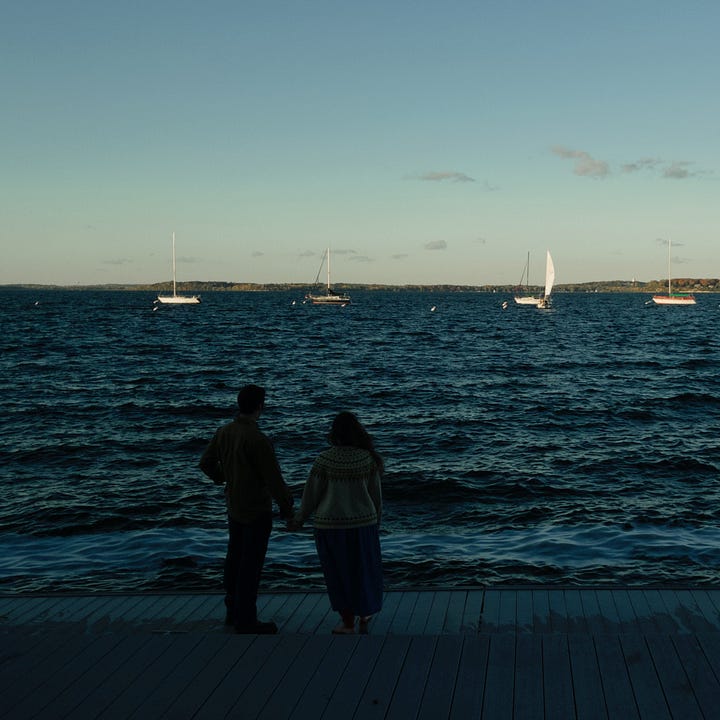
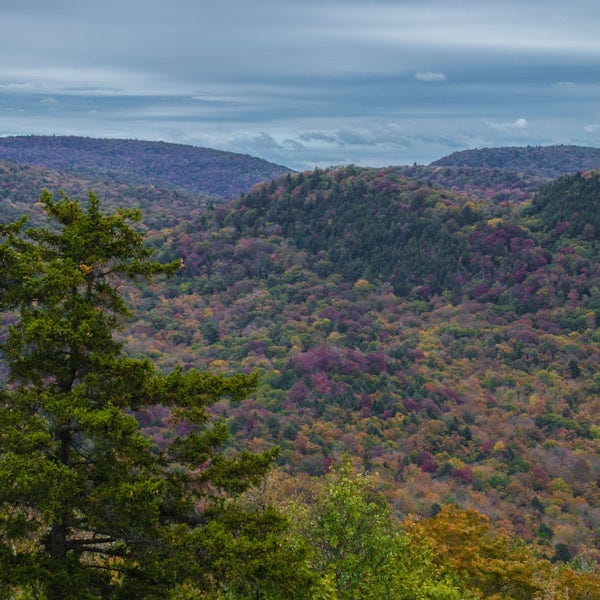
This essay is the first of many in this project; let this be our introductory note insofar as Hickman’s Hinterlands is concerned. The project was borne of profound disillusionment, but it has stirred in both me and my wife a strong sentiment that we are here — for good. We could run to Argentina, or to Mexico, or to France, but we would still be Americans. We’d be Americans who left the lame party without ever even trying to get it started, and we’d miss home to boot.
What would the point of that be?




